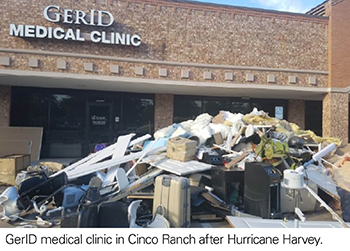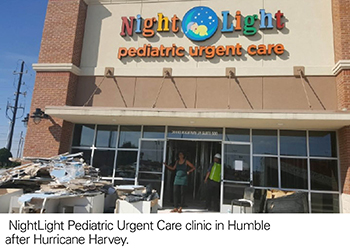Nov. 20, 2017
Doctors’ Offices in Eighteen Cities Receive Funds to Rebuild


The TMA Disaster Relief
Program, set up to aid Texas physicians’ practices damaged by Hurricane Harvey,
has reached the $1 million mark. A gift of $5,000 from the Michigan
State Medical Society Foundation to the Texas Medical Association Foundation
(TMAF) Disaster Relief Campaign, tipped the total raised to over $1 million, fulfilling the
campaign goal. Meanwhile, the program distributed its third round of funds to
affected practices, surpassing the half-million dollar mark in assistance.
The program distributes funds to physicians and medical practices that
sustained Harvey-related damage not covered by insurance or other sources of
assistance.
“Reaching the $1 million mark
is an affirmation of the commitment we made to support our fellow physicians in
Texas, and to support the patients in their communities during what for many
has been their greatest time of need,” said TMA President Carlos J. Cardenas,
MD. “I want to express my deepest gratitude towards all of the donors, from across
the country and even abroad, who contributed to get these practices up and
running again.”
The TMA
Disaster Relief Program, funded by TMAF and administered
by the Texas Medical Association (TMA) Physicians Benevolent Fund (PBF), this week approved
a new round of funding for damaged or destroyed medical practices. So far, TMA
has allotted a total of $569,890 to 49 medical practices which employ 135
physicians and 1,048 non-physician staff. The practices are located in federally
designated disaster areas including Baytown, Beaumont, Columbus, Dickinson,
Friendswood, Houston, Humble, Kingwood, Nederland, Orange, Port Aransas, Port
Arthur, Port Lavaca, Rockport, Spring, Sugar Land, Victoria, and Webster. In
most cases, the practices suffered extensive water damage that required
remodeling, repairs, relocation to temporary facilities, and replacement of
equipment. A PBF committee chaired by TMA Immediate Past President Don R. Read,
MD, of Dallas, reviews the applications monthly to determine assistance recipients
based on need.
TMA’s philanthropic arm, TMAF, received donations from
generous physicians, institutions, and other donors throughout Texas, the
United States, and abroad. Major contributions were also made by national
organizations like The Physicians Foundation, the American
Medical Association (AMA), the AMA Foundation, and New York's Henry Schein Cares Foundation. State medical
organizations like the Marshfield Clinic Health System in Wisconsin;
the medical societies of California, Massachusetts, Louisiana, and Rhode Island;
and county organizations including the Harris County Medical Society Retired
Physicians
also contributed.
“Our colleagues
in the family of medicine have stepped up to help maintain access to healthcare
in the areas affected by Hurricane Harvey,” says Dr. Cardenas. “With their
help, TMA can support the physicians and patients of Texas in their hour of
need and be that pillar of strength in the face of adversity.”
Approximately
two-thirds of physicians in disaster area counties told TMA they had to at
least temporarily close their practice due to the massive storm. TMAF continues
to accept contributions in hopes of helping each physician rebuild and
care for patients again.
TMA is the largest state medical society in the nation,
representing more than 50,000 physician and medical student members. It is
located in Austin and has 110 component county medical societies around the
state. TMA’s key objective since 1853 is to improve the health of all Texans.
--30--
Contact: Brent Annear (512) 370-1381; cell: (512) 656-7320; email: brent.annear[at]texmed[dot]org
Marcus Cooper (512)
370-1382; cell: (512) 650-5336; email: marcus.cooper[at]texmed[dot]org
Connect with TMA on Twitter, Facebook, and Instagram.
Check out MeAndMyDoctor.com for interesting and timely news on health care issues and
policy.